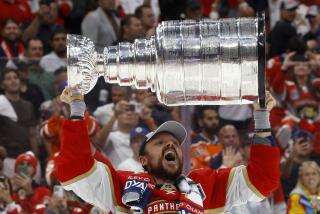THE NHL : He Wasn’t There in Time to Make the Save
Mine is not a unique horror story, but that doesn’t make it any less traumatic.
Like millions of others, I collected baseball cards as a kid. Without revealing my age, let’s just say that Mickey Mantle, Willie Mays and a pinch-hitter named Dusty Rhodes were big stuff when I was spending my hard-earned allowance for cards and that stale slab of bubble gum.
As I grew older, I discovered my shoe-box treasure was indeed kid stuff. Not too many of the girls I met seemed impressed with Dusty Rhodes.
By then, I had about 7,000 cards that I stored in the garage. Someday, I told myself, my treasure will be the coin of the realm.
Then, one fateful day, I came home to discover I had been robbed. Tired of this apparently useless clutter her teen-age son had dumped in the garage, my mother had given my life’s work to the trash collector.
You were too old for them anyway, she told me. What were you going to do with them?
The answer can be found, of course, in the thousands of card stores where this childhood hobby has become big business.
That’s hardly news. Stories about the ever-burgeoning card industry have been in this paper and others for several years.
What is news is the arrival of hockey cards, to take their place among those of other sports.
In 1989, only two card companies, Topps and O-Pee-Chee, dealt with hockey, issuing a total of 526 cards.
In 1990, four more--Score, Pro Set, Upper Deck and Bowman--joined in with the total number of cards rising to 2,482.
There are hat trick cards. There are cards on the Soviet teams.
And there are even Eric Lindros cards.
Here’s an 18-year-old who has yet to be drafted into the league, and he already has a series of cards.
According to the Province, a Vancouver paper, Lindros has received $25,000 for a six-card set.
But on the market, a Lindros card is already reportedly going for as much as $20 a card.
Imagine what they will be worth if he fulfills the promise of being the next Wayne Gretzky.
As for me, I’m left imagining what would have happened if I had gotten home from school early that dark day.
What they’re saying: The word among the Vancouver Canuck players is that General Manager Pat Quinn and Coach Bob McCammon have been given an ultimatum by the owners: Produce this season or else.
After a record 14 consecutive losing seasons, the Canucks got off to a good start and spent a great deal of the season in third place in the Smythe Division. But a recent slump, coupled with the resurgence of both the Edmonton Oilers and Winnipeg Jets, has dropped the Canucks back to their familiar spot in the Smythe cellar.
It also could drop Quinn and McCammon into the ranks of the unemployed.
What they’re not saying: After having his name pop up in trade rumors at least five times in the past year, the Kings’ Luc Robitaille has been absent from the latest round of speculation as another trading deadline looms in a little more than a month.
King General Manager Rogie Vachon has called Robitaille each time to deny the latest rumor.
“If he ever did get traded,” Vachon said with a smile, “and I had to call him, he probably wouldn’t believe me.”
Hat trick for the ages: Wayne Gretzky’s hat trick Saturday night was the 48th of his career, most in NHL history.
But even Gretzky doesn’t figure to eclipse the incredible feat of Bill Mosienko on March 23, 1952. Mosienko, playing for the Chicago Blackhawks that day against the New York Rangers, scored three goals in 21 seconds, putting his shots past goalie Lorne Anderson.
The accomplishment came up again recently when Mosienko was voted onto the Blackhawks’ all-time team, one of many honors surrounding the team’s playing host to the All-Star game.
Mosienko told the Chicago Tribune his memorable day could have been even more amazing.
“About 45 seconds later,” he said, “I was alone again. I faked Anderson out of position and had an open goal to hit . . . and shot wide.”
Ageless referee: When Andy Van Hellemond worked his 1,173rd game this month, he set an NHL longevity record, breaking a tie with Dave Newell. Van Hellemond, who began in 1972, has worked 14 consecutive Stanley Cup finals.
Quotebook: When the Pittsburgh Penguin trio of John Cullen, Mark Recchi and Kevin Stevens, all playing out their options, skated together, they were dubbed the Option Line.
Said Pittsburgh Coach Bob Johnson: “I’ll tell you how stupid I am. I thought the nickname meant that they had a lot of options on the ice.”
More to Read
Go beyond the scoreboard
Get the latest on L.A.'s teams in the daily Sports Report newsletter.
You may occasionally receive promotional content from the Los Angeles Times.






